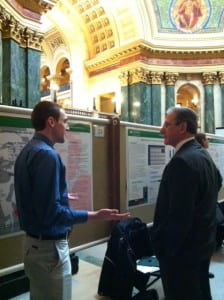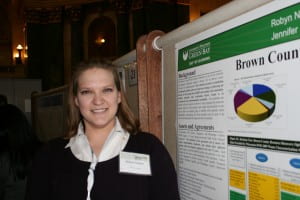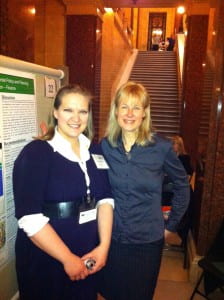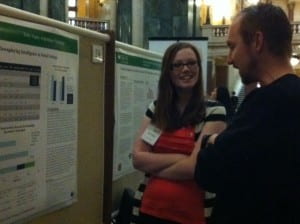The Fall 2013 NAS Seminar Series begins Friday, September 13th. Dr. Dajun Wang will present “Wildlife Research in West China: Threats and Conservation.”
Social gathering at 3:00 pm in ES 317
Presentation at 3:30 pm in ES 301
Communications regarding federal funding priorities for FY 13-14 have been received. It is clear that individuals from UW-Green Bay seeking funding for their research activities will have the greatest opportunity for success in gaining that funding if their proposals are addressed to one of the priorities. As such, the UWGB Office of Grants & Research (OG&R) will be focusing on identifying grant opportunities that meet one of the following federal priorities:
An important criterion for all proposals by all Agencies will be the use of evidence-based outcomes.
In order to assist in the search for funding of research projects OG&R will submit to the Log funding priority announcements within these categories on a bi-weekly basis. Additionally, upon request faculty who are interested in submitting a proposal within these initiatives will be provided funding opportunities based upon their specific field of interests (keywords provided by potential PIs). When available, examples of funded proposals will be obtained and shared with faculty/staff to assist in their proposal development. OG&R will also provide budget templates and all other necessary forms to the PIs and assist with budget and proposal development as requested.
It is suggested that student research projects, especially those that will have the potential for presentation as part of Posters in the Rotunda, be focused on one of the priorities noted above.


An International Approach to Examining the International Baccalaureate (IB) Mathematics Studies in the United States: Comparing a Topic in Statistics between IB and Chinese High School Mathematics Textbooks
Abstract: Hoping to find the evidence of how International Baccalaureate (IB) programs may help U.S. students compete academically with students from other countries, I examined textbooks from an IB math program and a Chinese high school to determine similarities and differences in a purposefully selected topic on a basic statistics concept.

Luteolin Suppresses Daidzein Induced Cell Proliferation in Breast Cancer Cells
Abstract: We evaluated the effects of luteolin, a phytoestrogen found in a variety of fruits and vegetables, and daidzein, a phytoestrogen found in soy, alone and in combination on cell proliferation in MCF-7 BOS breast cancer cells. We found that luteolin suppressed daidzein induced cell proliferation and daidzein antagonized the anti-proliferative effects of luteolin. These findings have broader implications in regards to using dietary phytochemicals as chemotherapeutic agents.


German Media and the 2012 US Presidential Election: How Ideology, Regionalism, and Issue Coverage Shape the German Public Attitude toward US Politics
Abstract: This research project, under the guidance of Dr. Levintova, investigates German media coverage of the 2012 US presidential election. Using 247 articles across the ideological spectrum during the period from July 2012 through mid-November, three questions are explored: how the political orientation of each news source affects its coverage of the candidates, how the regional coverage of each source affects its portrayal of the election, and what issues each source covered and how its regional or ideological orientations affect issue coverage.


Brown County Zero Waste
Abstract: UW-Green Bay Environmental Policy and Planning student Robyn Nielsen presents the findings of the Brown County Waste Stream Committee’s year-long work to establish a business plan and long-term strategy for redirecting waste from landfills, by turning it into marketable materials, as part of a more environmentally sustainable local economy.


Role of Cultural Congruence and Trust in Online Charitable Giving
Abstract: We study the influence of cultural-congruence on the relationship between trust and intention to donate online. We created two exact website homepages – with different images in order to manipulate the cultural congruence. Each respondent saw only one type of homepage, and answered the questions. We got 352 useful observations.


Hidden Intelligence: Downplaying Intelligence in Social Settings
Abstract: This study was aimed at better understanding why people might downplay their intelligence. Participants took a survey which consisted of scenarios and questions measuring personality characteristics. A regression analysis will be performed to see what predicts hiding one’s intelligence. Revisions will be made to create a measure. Results are pending.
| 12th Annual UW-Green Bay Academic Excellence Symposium | 10th Annual Posters in the Rotunda: A celebration of undergraduate research | |
|---|---|---|
| Sponsor | UW-Green Bay Chapter of Phi Kappa Phi National Honor Society, the College of Liberal Arts and Sciences, and the College of Professional Studies | The University of Wisconsin System and the UW-Green Bay Office of Grants and Research |
| When | Wednesday, April 10th, 2013 from 11:30AM – 2:30PM | Wednesday, April 17th, 2013 |
| Where | Phoenix Rooms A-B-C and the lobby of the University Union, UW-Green Bay Campus | State Capitol Rotunda; Madison, Wisconsin |
| Requirements / Eligibility | Proposal deadline: March 6th, 2013 Undergraduate and graduate students are eligible. |
Application: Deadline March 13th, 2013 Must be able to attend the Celebration in Madison, WI. Only undergraduate students are eligible. |
| Contact | For more information contact: Teri Ternes, TH 335 ternest@uwgb.edu |
For more information and the application, visit www.uwgb.edu/research. Email applications to Lidia Nonn at nonnl@uwgb.edu |
A Celebration of Undergraduate Student Research
Wednesday April 17th, 2013, Capitol Rotunda, Madison, Wisconsin
General Information
‘Posters in the Rotunda’ – intended to highlight the extent, quality, and value of undergraduate involvement in faculty-guided research projects. Students and faculty from all UW schools will have the opportunity to display their work for Wisconsin legislators in the Capitol Rotunda, highlighting the importance of undergraduate research and education support at the state and national levels.
For further PITR information and to view past events visit www.wisconsin.edu/posters/index.htm.
Application Information
Application deadline: 9:00 a.m. Wednesday, March 13th, 2013. Submit your completed application, via e-mail, to Lidia Nonn at nonnl@uwgb.edu. Selected applicants will be contacted by the PITR Coordinator. In addition, selected applicants will need to submit a completed poster by March 25th, 2013. Please Click Here for Posters in the Rotunda Application Form.
A faculty mentor is required: Each presentation should be sponsored or co-sponsored by a UWGB faculty mentor(s); non-sponsored abstracts will not be accepted.
Presentation Information
Poster specifics: If chosen to present, the PITR Coordinator will be in contact with you. Presenters will need to construct a self-supporting poster to be placed on an easel for viewing. Students will receive one-on-one assistance in creating their poster or adapting it for the session in Madison. Presenters will receive assistance with poster printing costs and easels will be provided.
Eligible work: An eligible presentation will report, perform, or represent the outcome of substantial work by a student or group of students. While the project may have its origin in an assignment for a class, the presentation should show it has been developed above and beyond a class requirement. It is a paper, artifact, or performance that can truly be called a creative achievement.
Abstract requirement: Each poster presentation requires an abstract. An abstract is a summary of the project and should reflect the professional format normally associated with scholarly work in its discipline (e.g., an abstract of an artistic performance may be similar to the program notes that typically accompany such a performance; science abstracts typically include background information, methods, results, and a brief discussion).
Abstract preparation: Student authors should adhere to professional submission standards when preparing abstracts and should work with their faculty mentors to ensure that their abstract is correct, complete, and that all guidelines are followed. The body of the abstract should not exceed 50 words, and can be composed and edited using standard word processing software. The final abstract, along with other information, will need to be submitted electronically via the application form.
Faculty mentor is required: Each presentation should be sponsored or co-sponsored by a UWGB faculty mentor(s); non-sponsored abstracts will not be accepted.
Interdisciplinary presentations: Interdisciplinary presentations are especially encouraged!
Travel: Travel to Madison will be provided.
If you are interested in participating but aren’t sure, contact the Office of Grants & Research, we will be happy to talk you through your research, poster, or the event with you! Presenting at the Posters in the Rotunda (PITR) symposium is an excellent way to share what you know or what you’ve learned in your field of research. It’s also a great way to meet new people from the other UW campuses. So don’t wait – participate!